The Painless Illustrated Guide to the (University) UK Grading System

- Originally published
- Last updated on March 25th, 2024 at 08:44 pm
Table of Contents
From the jargon of GCSEs and ETCS grades to first, second, and thirds, and the annoying habit of never assigning any student the top 30% worth of scores, the UK grading system can be one big mystery to outsiders.
It can also make students hesitate before jumping in: what if I can’t take my 65% and apply to grad school?! Will they think I have Ds?! Will I ever get a job outside the UK?!
With more students wondering if they’ll even be able to stay in the UK after graduation these days, the ability to take a UK degree back home is paramount. And after all, if students can’t understand what their scores mean, how will future foreign employers?
Even if you’re not spiraling with future fears about how awful your (very good!) UK grades look in the states, you certainly need to know what the 2 countries’ differences look like to decide if one system is right for you. It goes beyond simple scoring translations.
We wanted to know exactly how the systems differ, so we talked to current international students and put together a primer on what they like, dislike, and how it all works. So, let’s talk about the big differences in the UK and US grading and teaching systems in universities.
The UK Grading System
In UK universities, student work is scored on a percentile system of 0 to 100%. The best performers in the class score over 70%, and graduate with what’s called a “first” or “1st class honors” degree. Scores 60 to 69% are a 2:1 or “upper second class honors” while 50 to 59% is a 2:2 or “lower second class honors” and 40 to 49% is a “third” degree designation, still a passing grade.
Here’s what those scores look like in terms of overall performance and US grades:
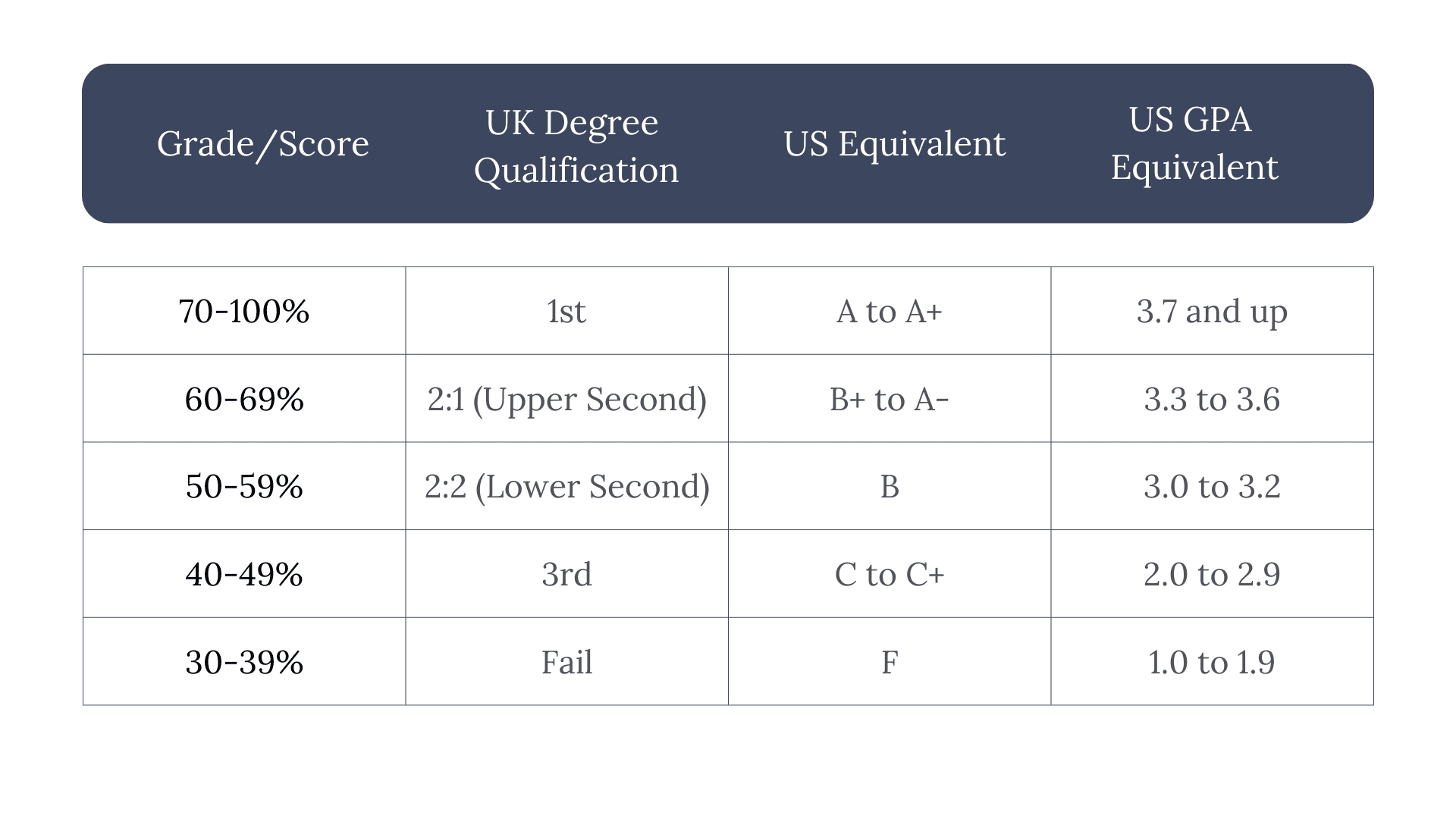
What does it mean to be a top student? Here are the basics. We’ll go through each “honour’s score” and how they’re different, too.

What is a First Class Degree?
In U.S., universities have fancy Latin honors like summa cum laude and magna cum laude.
In the UK, they have their own way of celebrating academic excellence, but instead of Latin, they use classifications. The top honor? That’s called a “First-Class Degree,” or simply a “First.” It’s like the summa cum laude of the UK, a sign that you’ve really nailed your studies.

The UK grading system is a bit like a ladder. At the top, you’ve got the First-Class Degree. This is the gold standard, indicating you’ve achieved an average of 70 or above in your exams and coursework. Think of it as having a GPA of 3.7 to 4.0; it’s the academic equivalent of hitting a home run.
What is a Second Class Degree?
Next up is the Upper Second-Class Degree, commonly known as a 2:1 (pronounced “two-one”). This is akin to the magna cum laude, signaling you’ve done pretty darn well, with marks between 60% and 69%. It’s a strong performance, kind of like batting .300 in baseball—definitely something to be proud of.
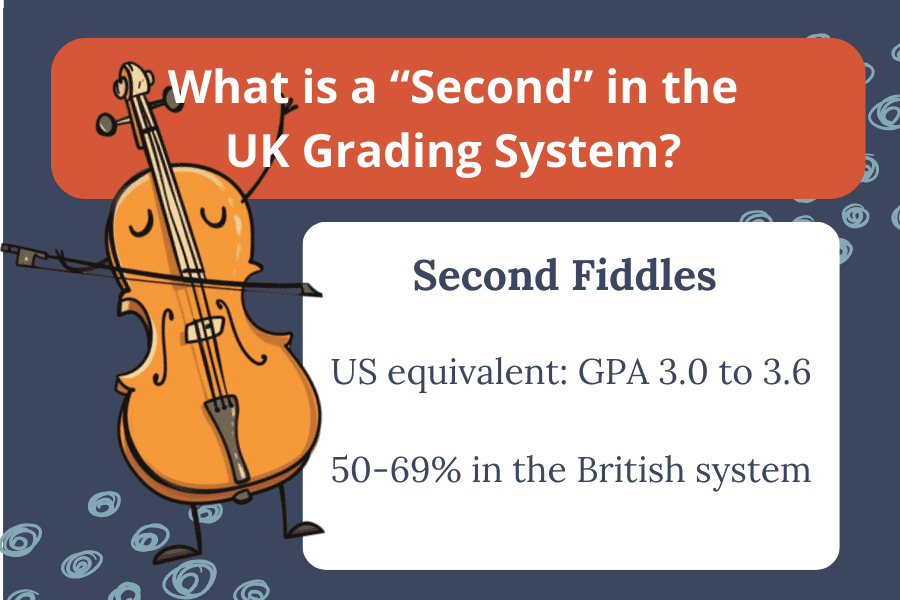
When it comes to job hunting in the UK, these degree classifications can play a big role, much like how GPA and honors can influence job prospects in the States.
Many employers, especially the more competitive ones, tend to set the bar at a 2:1 or higher. It’s their way of filtering for candidates who have shown a high level of understanding and skill in their field. Landing a job with a First or a 2:1 on your CV is like walking into an interview with a medal pinned to your chest; it gets you noticed.
However, just like in the U.S., it’s not all about grades. Work experience, personality, and how you fit with the company culture are huge. But, having that top-notch degree classification can definitely give you a leg up in a crowded job market, sort of like having an extra feather in your cap.
What is a Third Class Degree?
In the UK grading system, a “Third-Class Degree,” often simply referred to as a “Third,” is another rung on the academic ladder. Think of it as the UK’s version of a “Gentleman’s C:” though it’s not conferred just for social reasons, it indicates a student has put some work in, and should pass, but without accolade or honors.
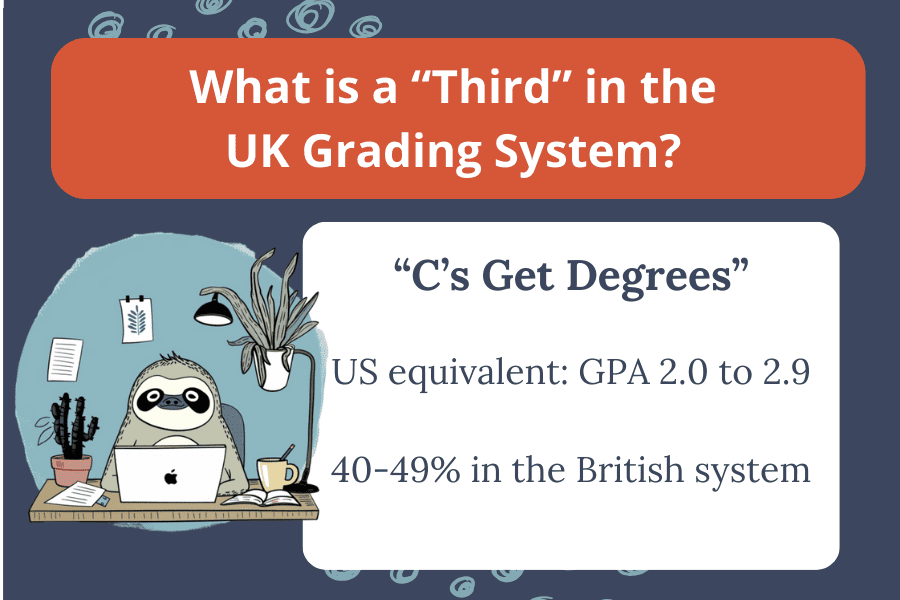
A Third-Class Degree signifies that a student has achieved an overall average mark of between 40% and 49%. It’s the minimum passing grade for obtaining an honors degree in the UK, indicating that while the student has met the basic requirements to graduate, they’ve done so with marks that are on the lower end of the scale.
In terms of comparison to the U.S. system, there’s no direct equivalent, but it might be seen as achieving a GPA lower than 3.0—indicative of passing but without the distinction or high honors that come with higher grades.
When it comes to job hunting and career prospects, having a Third-Class Degree can present more challenges, especially in highly competitive fields or for roles that demand top academic credentials. Employers might prioritize candidates with higher classifications, like Firsts or 2:1s.
However, a degree is just one aspect of a candidate’s profile. Work experience, skills, personality, and how someone fits within the team or company culture can often outweigh the class of degree.
Many successful individuals have started with Thirds and gone on to achieve great things in their careers.
What Does It Mean to Fail?
Something a little different in each country. What’s important to note is that your percentage is less important than what it means to your professor and your school. You won’t get a degree with a percentage stamped on it!
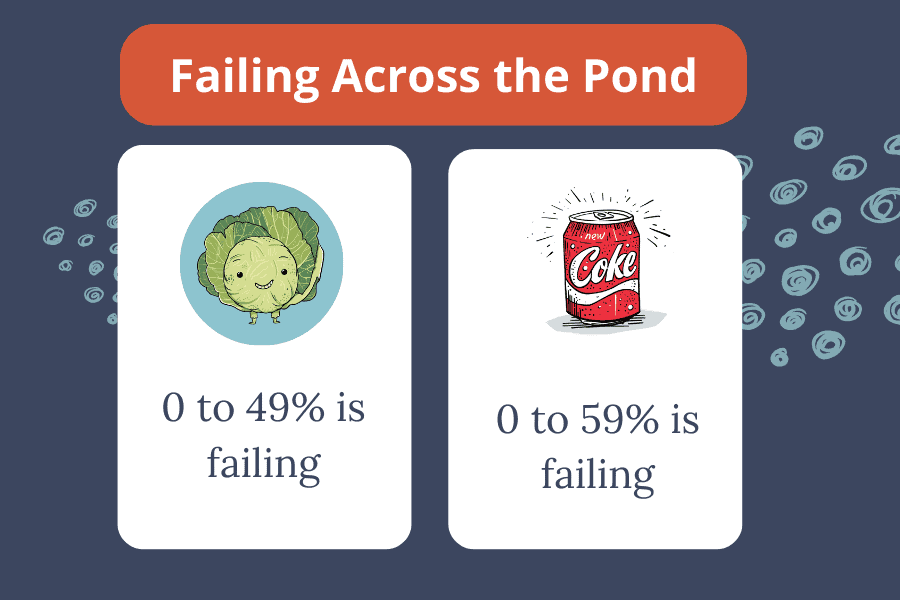
The Grading System in the UK vs US: The Grading Spectrum
Both countries grade students on a scale of 1 to 100, but where the entire class lands on that spectrum looks different in each country. The bulk of students in the UK score under the 75% mark, and often, students find that no one in their class scored 70% or above on a particular assignment.
In the US, the bottom end of the spectrum is a largely uninhabited space. Students who achieve as close to “awesome” as a professor expects possible on a given assignment are rewarded with top scores, and the level of “A” grades (90% to 100%) is unheard of in the UK.
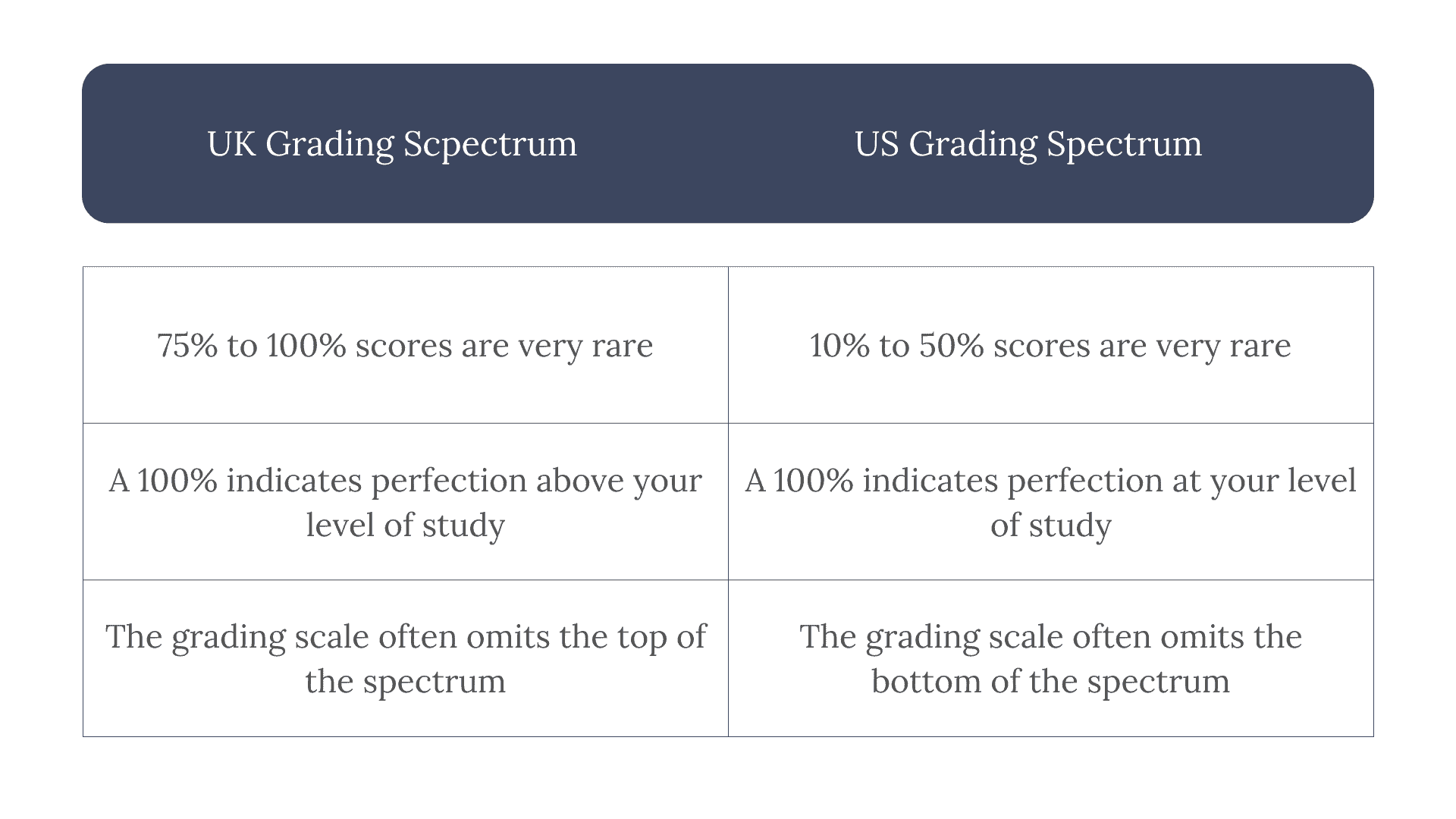
Where are the big gaps in each country?

Typically, in the US, when a student hands in something, they score over 50%. That means there are a handful of 0 scores, but then there’s a gap before students are granted the D- that means, “Congrats! You did a thing!”
In the UK, low scores are much more common. While there is a gap at the low end, it’s far less pronounced than in the US.
In-Class Expectations Within the UK University Grading System
The differences between the UK and US university grading systems go beyond sliding the spectrum over while keeping your grade the same.
What you’re expected to do for that grade is also different.
To get awarded that coveted “first,” your professors won’t just expect first-rate essays and tests dripping with facts and figures.
These 2 lists are generalizations! But they represent what the majority of students told us about the different classroom and grading expectations for student work:
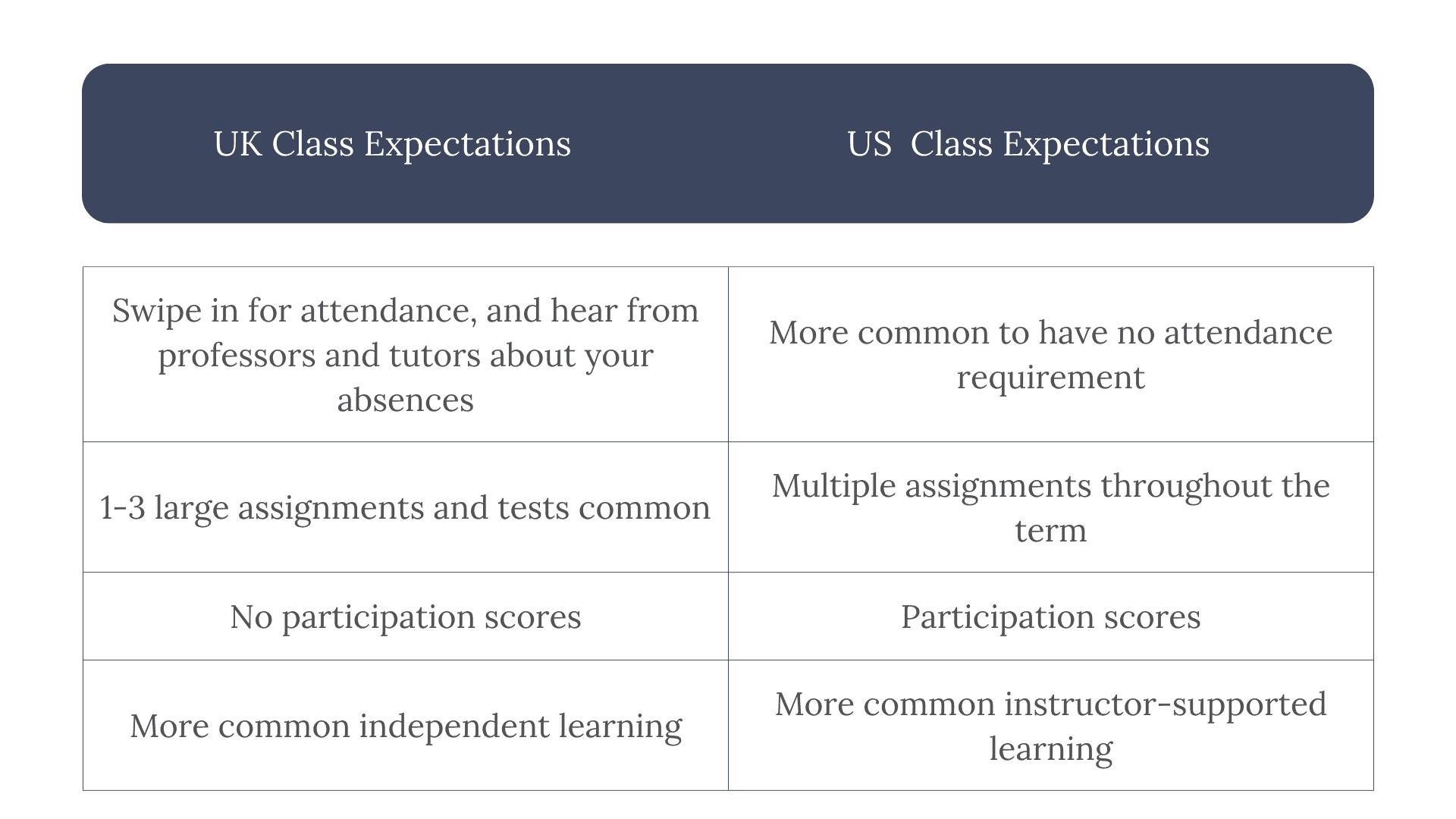
We found that a lot of UK students believe that the UK encourages students to be more independent and mature, while they said the US system would not be to their liking because it treats students as less adult.
What’s funny is that US students in the UK said they believed the US system treated students more like adults.
Who’s right? Maybe both. It’s all about how you look at it. Here are 2 student quotes that sum up the grading differences in term of the UK grading system and what it expects of college-aged students.

And here’s some more context to these quotes. Each of these students says they prefer the system they have in their “home” country.
But both systems rock. It just depends on what you’re able to get comfortable with, and where you’re able to learn best.
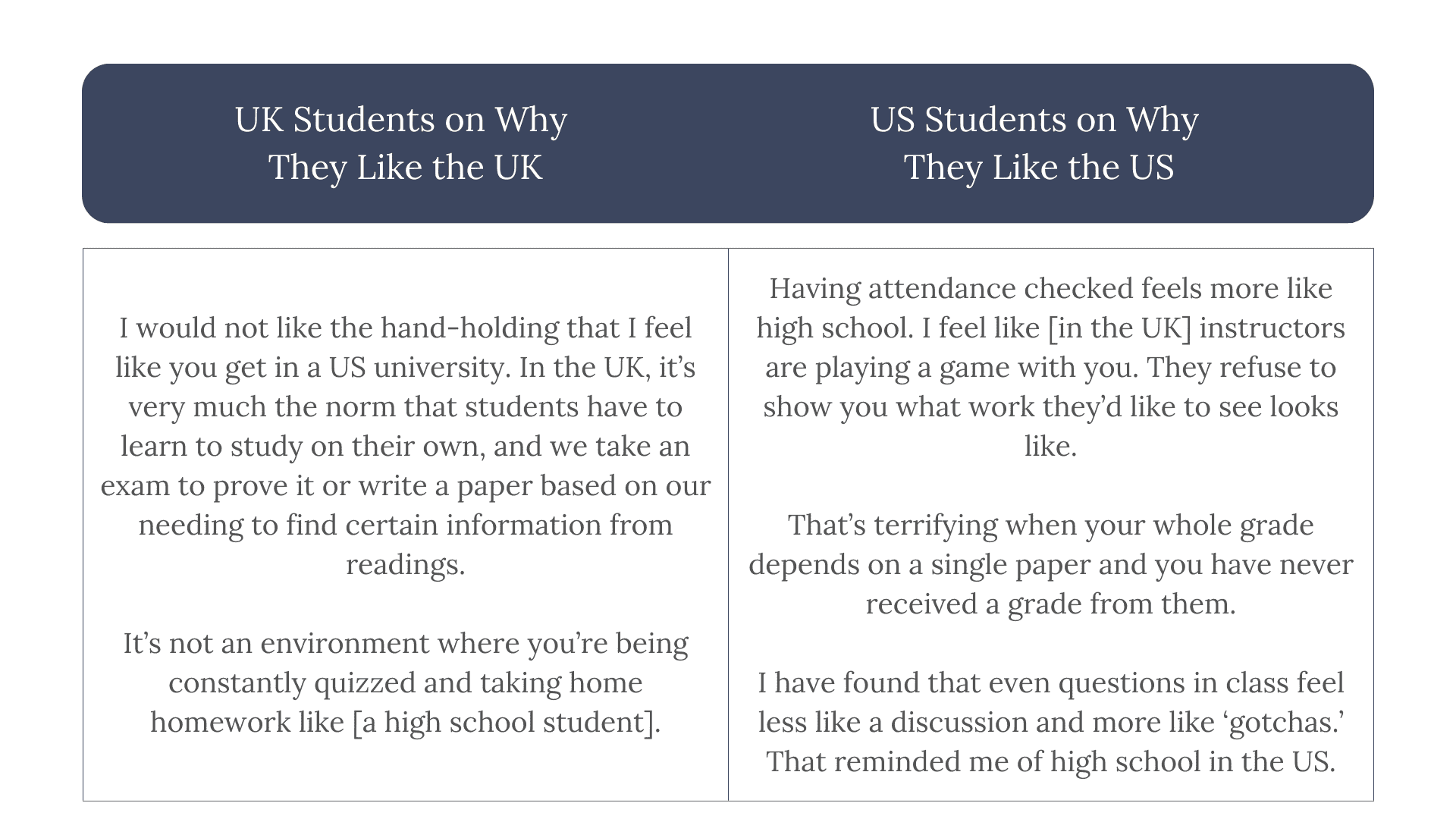
We can’t stress enough: this is a generalization. More and more, UK universities are turning to multiple assessments, more short papers, and some feedback rather than a “make or break” assignment schedule.
Still, it’s still far more common to find large university exams in the UK, with students gathered in a hall, Harry Potter style, to take exams that will determine their final university degree designation.
The University Grading System in UK Universities May Be Right for You
While the educational system in the UK differs from the states, and the percentages you’re awarded in class can scare the pants off perfectionistic US scholars, they’re really not so different.
You’re scored within your cohort of fellow students, and so that 70% you achieve is a top grade no matter what the number says. You’ll end up with top final grades and a “first” for your qualification. And that’s great!
Undergraduate degrees from the UK are well-understood by global postgraduate admissions offices.
They’ll understand your academic achievements, from “first-class honours” to “second-class honours” and even the nuances of an “upper-second class honours” versus “lower second-class honours” degree.
So leave your worry behind and make your decision based on whether the UK grading system is right for you and you alone.
To get more of a sense of whether the UK education system is your cup of tea, look into some other articles that may help you decide:
Related Posts

Jessica Share
Jessica is the writer, Ph.D., and mom-of-an-abroad-student-in-the-UK at the helm of College Abroad Guides. When she's not asking college students where the coolest place to hang out in their city is, she's figuring out how she can make $60 imported Greek oregano potato chips and £50 British bacon potato chips appear on her doorstep for the cost of a local bag of Lay's.





